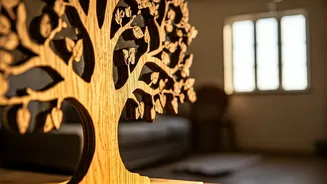Family's Central Role
In many cultures, including India, the dynamics of a couple's marriage extend significantly to encompass their respective families. The well-being of a marriage is
often intertwined with the level of acceptance and interaction between the partners and their in-laws. Positive relationships with family members can provide crucial support systems. They create an environment where the couple feels secure, understood, and appreciated. On the other hand, strained or challenging interactions with in-laws can introduce tension, conflict, and emotional stress. Successfully navigating these relationships requires empathy, effective communication, and a shared understanding of family values. Cultivating a supportive environment is essential for nurturing a lasting, happy marriage.
Building Healthy Boundaries
Establishing and maintaining clear boundaries is an essential component of managing relationships with in-laws. Boundaries define the limits of emotional and practical involvement between a couple and their extended family. These boundaries should be mutually agreed upon and communicated respectfully to ensure they're upheld. Setting these boundaries can involve discussions about financial contributions, living arrangements, childcare responsibilities, and how much personal information is shared. It is paramount that both partners work together, presenting a united front when interacting with in-laws. This consistent approach strengthens their bond and protects the marriage from external pressures. While open communication and mutual respect are essential, establishing healthy boundaries can minimize misunderstandings and conflicts. It allows the couple to prioritize their relationship and make decisions independently.
Legal Considerations Examined
The legal implications regarding relationships with in-laws often vary depending on the jurisdiction and specific family circumstances. In some cases, in-laws may have legal rights or responsibilities, especially concerning inheritance, property rights, or the guardianship of children. Understanding these legal nuances is critical. It is advisable for couples to seek legal counsel to clarify their rights and obligations within their local legal framework. Prenuptial agreements or postnuptial agreements can clearly outline financial matters and protect individual assets. These agreements become particularly important when significant assets are involved or when there are complex family financial situations. Furthermore, legal documentation like wills, trusts, and power of attorney documents can clarify inheritance and healthcare decision-making, ensuring that the couple's wishes are respected and that their family's future is secure.
Fostering Open Communication
Clear, honest, and respectful communication is essential for cultivating positive relationships with in-laws. Open dialogues should be prioritized, where each person feels comfortable expressing their thoughts and feelings. Active listening, where partners truly hear and try to understand their in-laws' perspectives, reduces misunderstandings and fosters mutual respect. Effective communication includes the ability to constructively address conflicts as they emerge. It involves acknowledging disagreements, offering apologies when appropriate, and working collaboratively towards solutions. Couples may benefit from family meetings or regular check-ins to discuss potential issues before they escalate. It's critical to avoid gossiping or speaking negatively about in-laws to others, and instead, focus on addressing concerns directly and privately. Developing strong communication skills within the family is a journey that strengthens familial ties and promotes a more harmonious relationship.
Celebrating Cultural Differences
Cultural differences often influence how families interact and view their roles within the family unit. Understanding and appreciating these differences is essential for promoting harmony and mutual respect. This includes being aware of varying traditions, values, and expectations regarding family dynamics. For example, some cultures prioritize collective decision-making, while others may emphasize individual autonomy. Couples must strive to be adaptable and considerate, making an effort to learn about each other's family cultures. Participating in family traditions and celebrating important events together allows for understanding and appreciation of different cultural backgrounds. Making an effort to embrace each other's unique family customs shows respect. It promotes a sense of inclusivity that strengthens the bond between the couple and their extended families.
Seeking External Support
Sometimes, navigating complex family dynamics may require seeking external support. Couples may consider individual therapy or couples counseling to address relationship challenges and develop better communication strategies. A therapist can offer an impartial perspective and provide practical tools to manage conflicts, set boundaries, and improve communication within the family. Family therapy, involving the couple and their in-laws, can also be beneficial in facilitating open dialogues and addressing underlying issues. Additionally, consulting with a mediator or a financial advisor might be advantageous in dealing with particular family issues. Choosing a therapist or advisor who is skilled in family dynamics can ensure that the support provided is relevant and effective, ultimately promoting stronger and healthier family connections.



















